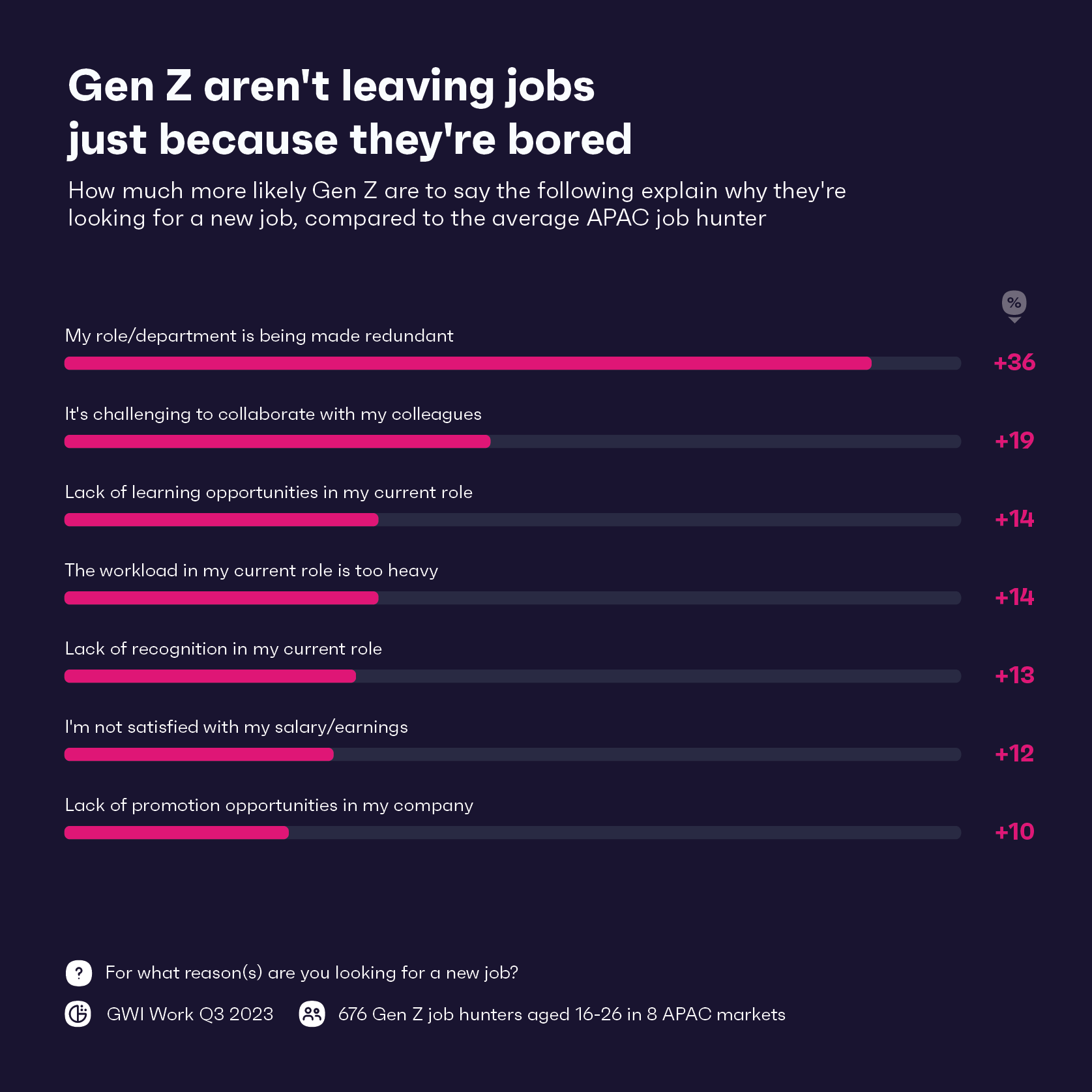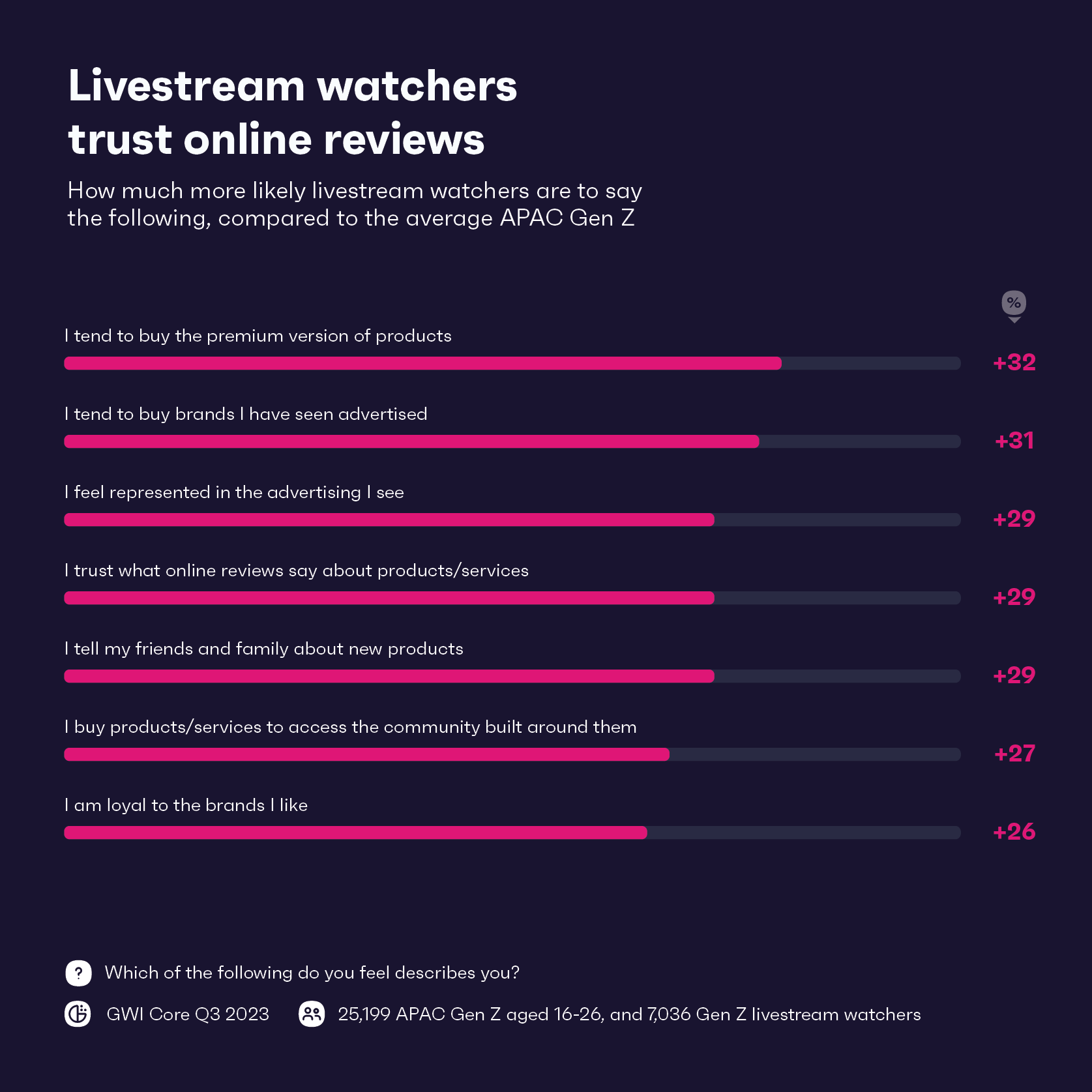Neglect all the pieces you thought you knew about Gen Z. Whereas it’s tempting to lump this group collectively, Gen Z in Asia are a various and complex lot, who’re reshaping tradition and enterprise as we all know it.
From Australia to Singapore, they’re driving new developments and provoking manufacturers to take a seat up and listen. So depart your Gen Z stereotypes on the door as we take a more in-depth have a look at who they are surely, constructing on 5 key insights.
Gen Z developments in Asia/APAC:
- Residing at house is the brand new norm
- Gen Z in Asia aren’t lazy; they need studying alternatives
- They’re the most certainly to make use of AI platforms to go looking
- Gen Z in APAC stand out for watching livestreams
- Many Gen Z don’t really feel snug speaking about psychological well being
1. Residing at house is the brand new norm
The common Gen Z in APAC is single, a scholar, with out kids, and lives with their mother and father. Whereas the bulk fall into these brackets, an rising quantity are beginning households of their very own, working in full-time jobs, and getting married.
We’ve seen a 94% enhance within the variety of Gen Z in APAC working full-time since Q3 2018.
Their priorities are altering, however in true Gen Z style, they’ve discovered points with “adulting”. For starters, it’s comparatively more durable for Gen Z in Asia to maneuver out. 73% of this group in APAC dwell with their mother and father – that’s greater than every other area, and considerably greater than the proportion of millennials who say they lived with mother and father at their age.
Whereas many are concerned about getting on the property ladder, perceptions are altering, and there’s much less stigma round staying at house. Gen Z even make it look enjoyable, having extra freedom to journey and purchase luxurious treats. It’s a part of the explanation why Nike’s “going all in on luxury-obsessed Gen Z”, and maybe they’re proper to; there’s been a 25% rise within the variety of Gen Z in APAC saying they’ve purchased from luxurious manufacturers within the final three years.
This exhibits how numerous this era is. A fraction of this age group are married with kids, whereas others are having fun with the advantages of dwelling with mother and father for longer. Manufacturers have to maintain tabs on this influential era as their values and priorities proceed to alter.
2. Gen Z in Asia aren’t lazy; they need studying alternatives
There’s a standard stereotype that Gen Z job-hop greater than different generations which, on a primary degree, is true.
Over a 3rd of Gen Z enterprise professionals in APAC say they’re prone to seek for a brand new job within the subsequent 6 months, and so they’re 13% extra doubtless than common to say they’re very eager to do that. But it surely isn’t simply all the way down to them being bored; there are extra components at play.

Quite a lot of consideration appears to be given to Gen Z’s affiliation with “quiet quitting” and “lazy lady jobs”, however this stereotype doesn’t do them justice. Gen Z job hunters in APAC are 36% extra prone to say they’re looking for a brand new job as a result of their function is being made redundant. Past this, they discover it exhausting to collaborate with colleagues, and really feel there’s an absence of studying alternatives and recognition.
When on the lookout for a brand new function, Gen Z job hunters in APAC are 50% extra prone to say studying alternatives are a precedence.
It’s not unusual for Gen Z employees to affix a brand new function and be given numerous uninspiring admin duties. Firms ought to map out clear development plans and usually reward them for good work to maintain Gen Z staff engaged and motivated.
Additionally they have to rethink their recruitment technique, as many in APAC flip to social media when in search of out new jobs. Gen Z are 23% extra doubtless than common to seek for a brand new job via adverts on private social media platforms, and over a fifth plan on doing this through adverts on skilled platforms like LinkedIn.
It’s essential for manufacturers to look past stereotypes and acknowledge there are lots of the explanation why this youthful era leaves jobs. If manufacturers wish to recruit Gen Z expertise, it’s important to get on board with the platforms they’re looking out on and spotlight studying alternatives.
3. They’re the most certainly to make use of AI platforms to go looking
In APAC, Gen Z are the one era to rank AI third on the record of search platforms they use most – forward of voice search, picture search, and model/retail platforms. This says so much, as amongst millennials, AI platforms rank seventh.
In comparison with the remainder of APAC, Gen Z are 49% extra doubtless to make use of AI platforms to seek out data.
AI affords a customized expertise to customers, and customised services or products are one thing over 1 in 4 Gen Z need from manufacturers. With the emergence of instruments like ChatGPT, Claude, and Bard, simply to call just a few, manufacturers have a possibility to get inventive with how they use AI.
One model that’s efficiently carried out it into their app is Sephora. It has a variety of AI instruments on its platform, together with a digital assistant that gives rewards and promotions to customers. That is very becoming for the area’s Gen Z, as many say they’d think about using an AI chatbot when purchasing on-line for worth comparability (54%), help with questions (42%), and budgeting assist (36%).
By incorporating this know-how, manufacturers are future-proofing their advertising technique, enhancing the client expertise, and serving to to create a extra seamless buy journey.
4. Gen Z in APAC stand out for watching livestreams
Now that life is nearer to what we’d name “regular”, livestream viewership has slowed down. There’s been an 11% drop within the variety of Gen Z in APAC watching dwell movies since Q3 2021. However that doesn’t essentially imply it’s in manufacturers’ greatest pursuits to take a step again from the medium.
We’ve spoken about rising sports activities viewership on-line in our Connecting the dots report, however sports activities matches aren’t stacking as much as livestreams simply but.
Extra Gen Z in APAC have watched a livestream within the final week than a sports activities match on-line (29% vs 24%).
Livestreams have been common in APAC for a while, and Gen Z in Indonesia are significantly keen on them, with round 2 in 5 having watched one within the final week. We see comparable numbers in Malaysia, Vietnam, Hong Kong, and China.
Not solely that, however they’re a really efficient advertising channel.

Gen Z in APAC who watch livestreams are more likely to say they belief what on-line opinions say about services or products, as a result of they’re capable of see the product being demonstrated in real-time. This implies they’re extra prone to grow to be model ambassadors, loyal to corporations they like, and are extra receptive to promoting generally.
Basically, livestreams are a approach to attain a really helpful section of the Gen Z viewers in APAC, and permit for genuine product opinions and promotion. And we’ve seen corporations like L’Oréal doing so much for his or her model via dwell commerce.
5. Many Gen Zs don’t really feel snug speaking about psychological well being
There’s a standard stereotype that Gen Z are extra vulnerable to psychological well being points, which has some reality to it. Gen Z in APAC are 48% extra prone to say they’ve a psychological well being situation than the regional common.
However one other stereotype is that Gen Z are very open and prepared to debate psychological well being, which is a flawed declare.
29% of Gen Z in APAC really feel snug speaking about it. Even amongst these with a psychological well being situation, it’s nonetheless just one in 3.
There are various the explanation why this is likely to be. To record some examples, it may very well be all the way down to the local weather problem being placed on their shoulders at a younger age, present world tensions, coping with the Covid pandemic throughout college or college, rising up with social media, and even monetary milestones like house possession seeming unachievable.
With this in thoughts, manufacturers must be cautious round psychological well being messaging, as Gen Z can spot inauthenticity a mile off. In APAC, they need manufacturers to help psychological wellbeing by encouraging folks to take day off to get better.
Within the office, companies ought to help staff and share psychological well being assets – whether or not by working with influencers to share their very own experiences, internet hosting discussions round psychological well being, and even donating to charities. So long as good intentions are behind these efforts, manufacturers and companies can even profit from them within the long-term – constructing a happier, more healthy workforce.
Attending to grips with immediately’s digital natives
Beneath the floor, Gen Z are way more nuanced than stereotypes painting. As they arrive of age, this era is navigating uncharted territory crammed with alternative and uncertainty.
They’ll want help as they do that, and can construct sturdy relationships with the manufacturers that actually perceive them and their wants.





